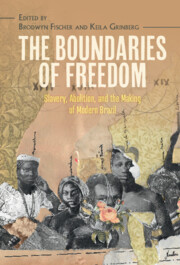Book contents
- The Boundaries of Freedom
- Afro-Latin America
- The Boundaries of Freedom
- Copyright page
- Contents
- Figures
- Tables
- Acknowledgments
- Introduction Slavery and Freedom in Nineteenth-Century Brazil
- Part I Law, Precarity, and Affective Economies during Brazil’s Slave Empire
- Part II Bounded Emancipations
- 6 Body, Gender, and Identity on the Threshold of Abolition
- 7 Slavery, Freedom, and the Relational City in Abolition-Era Recife
- 8 Migrações ao sul
- Part III Racial Silence and Black Intellectual Subjectivities
- Part IV Afterlives of Slavery, Afterwards of Abolition
- Bibliography
- Index
8 - Migrações ao sul
Memories of Land and Work in Brazil’s Slaveholding Southeast
from Part II - Bounded Emancipations
Published online by Cambridge University Press: 10 March 2022
- The Boundaries of Freedom
- Afro-Latin America
- The Boundaries of Freedom
- Copyright page
- Contents
- Figures
- Tables
- Acknowledgments
- Introduction Slavery and Freedom in Nineteenth-Century Brazil
- Part I Law, Precarity, and Affective Economies during Brazil’s Slave Empire
- Part II Bounded Emancipations
- 6 Body, Gender, and Identity on the Threshold of Abolition
- 7 Slavery, Freedom, and the Relational City in Abolition-Era Recife
- 8 Migrações ao sul
- Part III Racial Silence and Black Intellectual Subjectivities
- Part IV Afterlives of Slavery, Afterwards of Abolition
- Bibliography
- Index
Summary
This chapter joins empirical research with theoretical reflections in order to explore the formation of post-emancipation narratives and memories in Brazil’s slaveholding southeast. It is possible, in that region, to reintegrate the histories of freedom, control, and autonomy in the first decades of the twentieth century. In various archives and other historical sources, we can find inscribed – albeit in multivocal form – important intersections in the histories of land, labor, mobility, migration, control, and power. Even though planters sought to maintain freedpeople on the plantations where they had long worked as slaves, freedpeople’s pursuit of autonomy, in the form of control over the rhythms of work and access to land, eventually changed the geography of labor in those areas. In that sense, their experience was common to many societies across the Americas after abolition.
Keywords
- Type
- Chapter
- Information
- The Boundaries of FreedomSlavery, Abolition, and the Making of Modern Brazil, pp. 213 - 238Publisher: Cambridge University PressPrint publication year: 2022

